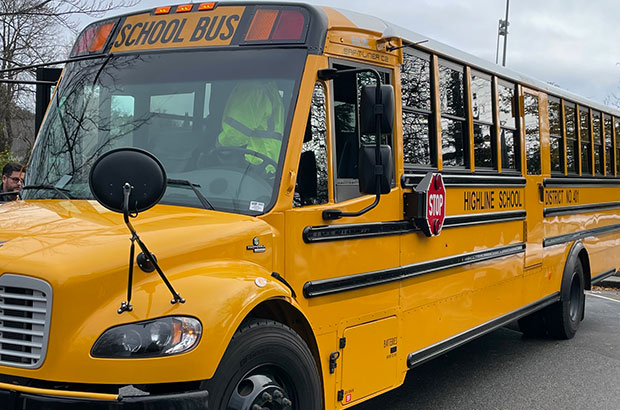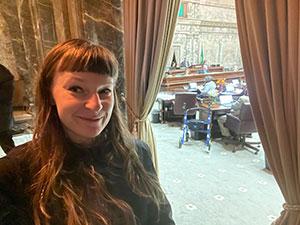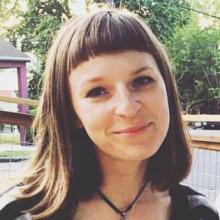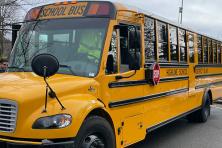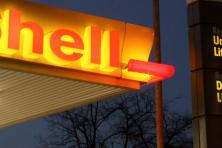In the waning days of this year’s legislative session in Olympia, I was able to stand in the wings of the Senate in the Capitol building as lawmakers debated and passed the 100% Clean School Buses bill. I watched with Representative Tana Senn, the bill’s prime sponsor, and a few other supporters. Just a month prior, we had been unsure whether the bill was going to move forward at all. But we didn’t give up, and after rounds of negotiations, we found a path and took it.
Nothing is over until it’s over.
This year’s legislative session was short, so we’re pleased that lawmakers passed a couple of bills that were top priorities for climate progress, including one to cut pollution from our state’s school bus fleet and another to clean up our largest utility. Both bills are now headed to the Governor’s desk, thanks in no small part to the work of the many advocates who took the time to contact their legislators in support of climate progress. Thank you!
Here’s a rundown of what the Legislature accomplished this year, and what they haven’t—yet.
100% clean school buses for kids
Kids all around Washington will soon have cleaner and quieter rides to and from school. HB 1368 sets us on a pathway to 100% clean school buses by requiring that school districts and bus contractors purchase only zero-emission buses once buying, fueling, and maintaining such buses becomes cheaper than diesel ones (this should happen within about five years). The soon-to-be-signed law also directs the state’s existing zero-emission school bus grant program to prioritize replacing the oldest and dirtiest buses on the road, and buses that operate in communities that are already more polluted. That’s good for the climate, childrens’ lungs, and even kids’ behavior on the bus and in the classroom! Legislators also allocated nearly $40 million for zero-emission school buses in this year’s supplemental budget; over half of that is funded through the Climate Commitment Act. Winning on 100% clean school buses was a major priority for Climate Solutions, as well as the larger Environmental Priorities Coalition.
Cleaning up Washington’s largest utility
HB 1589, also on its way to the Governor’s desk, will require the state’s largest gas and electric utility, Puget Sound Energy, to proactively plan for its transition to clean, zero-carbon energy. PSE will launch significant new programs to help its customers transition off fossil gas to clean electricity and create opportunities for low-income people to access this transition. Without this, low-income customers with gas in their homes will be stuck on a system with skyrocketing costs, leaving them with bills that will double by 2045. Instead, we will see a timely and managed transition to our clean energy future with the utility aiding customers with their bills and the switch to more efficient, electric appliances.
Affordable multifamily housing retrofits
Low-income Washingtonians are the least able to transition off fossil gas for heating and cooking. For tenants of affordable, multifamily housing, it is largely up to landlords to transition to all-electric, efficient systems and appliances. The Legislature allocated $55 million in incentives for energy efficiency upgrades and electrification retrofits in affordable multifamily buildings.
Clean buildings “Navigator” program
Significant new clean energy incentives are becoming available to households, funded by federal investments as well as Washington’s Climate Commitment Act. People interested in taking advantage of these incentives will need access to clear information, and community voices will need to be taken into account in how funds are administered. Unfortunately, this year’s Legislature did not pass HB 1391, a bill which would have created a one-stop shop and outreach campaign to do just that. Lawmakers did, however, vote to include $3.5 million in the budget to implement a program. It’s a start!
Taking advantage of federal funding
More clean energy funds than ever are flowing from the federal government to states and communities, thanks to the Bipartisan Infrastructure Law and the Inflation Reduction Act. However, governments and organizations need the capacity to apply for these funds, and to strategically focus them to provide the maximum benefit. We wanted the Legislature to reflect more of the federal funding-related items in their final budget, but lawmakers did allocate $11 million for both state-level and external grant writing assistance and general support, $25 million to leverage federal funding for projects that provide high-wage clean energy jobs, and $2.5 million for the state to create a funding portal and to conduct public outreach.
Port electrification
Sustainable maritime transport is one of the next frontiers for reducing climate pollution. The Legislature funded ways to help ports get there, including $477,000 for a study on adopting the at-berth shore power regulation (so ships at dock use electricity rather than burn dirty fuel), $250,000 to develop a sustainable marine fuels framework, $14 million for shore power at Terminal 18 in Tacoma, and $20 million for a Puyallup Tribe port electrification project.
What remains to be done
The oil industry makes extremely high profits selling gas in Washington state. But this year, the Legislature did not pass SB 6052, a bill which would require oil companies to be more transparent about their profits and prices. We need the state to make sure that consumers are not harmed by pricing malpractice as we transition to a clean economy. We will continue pushing to hold the oil industry accountable for the harms it has caused us.
The Legislature also needs to follow through and pass the policy recommendations from the state’s Transportation Electrification Strategy, continue improving our clean energy siting processes, and keep investing in a variety of climate and clean energy solutions across the state, meeting a goal of 40% of Climate Commitment Act investments directly benefiting overburdened communities.
The importance of perseverance
I started at Climate Solutions at the beginning of 2019. That spring, the Washington Legislature passed the Clean Energy Transformation Act, adopting a timeline for the state to achieve 100% clean electricity; this was the first big law in a series that has positioned Washington as a climate leader. That victory was very exciting, but climate advocates didn’t get everything we had hoped for that year; lawmakers did not pass the Clean Fuel Standard to cut pollution from the transportation sector—my area of work. They again failed to act on clean fuels in 2020, when the bill became a flashpoint for extremist, right-wing opposition. Put curtly, it was a bummer.
But we all kept at it. In 2021, the Legislature passed the Clean Fuel Standard, the environmental justice-focused HEAL Act, and the Climate Commitment Act. Since then, Climate Solutions has spent a lot of time and energy making sure that our state’s new climate laws are being implemented well, bolstered, and protected.
This brings me back to today: investments in clean school buses, affordable housing retrofits, clean appliance incentives, expanded transportation options, and more will not be possible if Initiative 2117—repealing the Climate Commitment Act—passes in November. I have learned through my five-plus years of policy advocacy at Climate Solutions that we cannot take any step along the way for granted—even victory. We have to work hard to pass climate policies, and we have to work hard to protect them, too. I think the above list of investments and new policies shows that the work is worth it. But better than words on a computer screen, the next time I see an electric school bus on the road and know the kids and the driver don’t have to marinate in diesel exhaust, I will be reminded that it truly is worth it. Let’s keep doing the critical work: tell everyone you know to vote NO on Initiative 2117 and stay tuned for more ways to protect our essential climate progress.
Nothing is over until it’s over.
